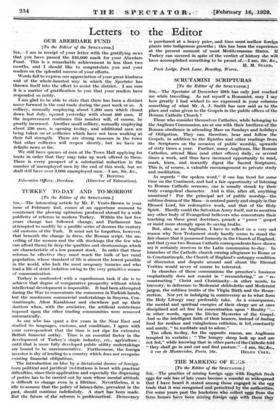SCRUTAMINI SCRIPTURAS [To the Editor of the SPECTATOR.]
Sin,—The Spectator of December 29th has only just reached me while travelling. As not myself a Romanist, may I say how greatly I had wished to see expressed in your columns something of what Mr. A. J. Smith has now said as to the place and value given to the Gospels in the public offices of the Roman Catholic Church ?'
Those who Consider themselves Catholics, while belonging to the Anglican Communion, are at one with their brethren of the Roman' obedience in attending Mass on Sundays and holidays of Obligation. They can, therefore, hear and follow the Gospels, in addition to the Epistles and other readings from the Scriptures on the occasion of public worship, upwards of sixty times a year. Further, many Anglicans, like Roman Catholics, attend Mass (and other offices) daily, or several times a week, and thus have increased opportunity to read, mark,' learn, and inwardly digest the Sacred Scriptures. This is, of course, a valuable encouragement to private study and meditation.
As regards " the spoken word," if one has lived for some time on the Continent, and had a fair opporttmity of listening to Roman Catholic sermons, one is 'usually struck by their truly evangelical character. And is this, after all, anything unnatural ? For the principal act of public worship—the sublime drama of the Mass—is centred purely and simply in Our Blessed Lord, his redemptive work, and that of the Holy Spirit. Hardly could the Salvation Army itself, not to mention any other body of Evangelical believers who concentrate their teaching on these great doctrines, preach a " purer " gospel or insist more strongly upon its saving truths.
But, alas, as an Anglican, I have to reflect on a very sad reason why New Testament study hardly seems to stand the fair chance that it possessed formerly in the Church of England, and that (your two Roman Catholic correspondents have shown us) it certainly receives in the Latin communion to-day. In branches of the Catholic church owning allegiance to Rome or to Constantinople, the Church of England's unhappy condition of dissension and dispute around and about the Eternal Verities would never of course be tolerated.
• In churches of those communions the preacher's business emphatically does not consist in " reconsidering," or " re- constructing " Christ and Christianity—in other words, to travesty, in deference to Modernist shibboleths and Modernist jargon, the sublime truths of the Virgin Birth and the Resur- rection. Nor yet in indulging in controversy as to what form the Holy Liturgy may preferably take. As a consequence, the mental and spiritual energies of their clergy are at once disciplined and set free for concentration upon " Reality "- in other words, upon the Divine Mysteries of the Gospel. And so the intelligent faith of their hearers, instead of finding food for restless and vainglorious criticism, is led, constantly and surely, " to meditate and to adore."
Too often to-day, for the opposite reason, are Anglicans tempted to exclaim : The hungry sheep look up and arc not fed," while knowing that in other parts of the Catholic fold " they shall go in and out and find pasture."—I am, Sir, &c., 3 rue de Montevideo, Paris, 16e. HELEN COLT.










































 Previous page
Previous page